- Home
- Howard Marks
The Howard Marks Book of Dope Stories Page 6
The Howard Marks Book of Dope Stories Read online
Page 6
Frankie felt no pity for himself, yet felt compassion for this McGantic. He worried, as the sickness rose in himself, about what in God’s name McGantic would do tomorrow when the money and the morphine both gave out. Where then, in that terrible hour, would Private M find the strength to carry the monkey through one more endless day?
By the time Frankie got inside the room he was so weak Louie had to help him on to the army cot beside the oil stove. He lay on his back with one arm flung across his eyes as if in shame; and his lips were blue with cold. The pain had hit him with an icy fist in the groin’s very pit, momentarily tapering off to a single probing finger touching the genitals to get the maximum of pain. He tried twisting to get away from the finger: the finger was worse than the fist. His throat was so dry that, though he spoke, the lips moved and made no sound. But Fomorowski read such lips well.
‘Fix me. Make it stop. Fix me.’
‘I’ll fix you, Dealer,’ Louie assured him softly.
Louie had his own bedside manner. He perched on the red leather and chrome bar stool borrowed from the Safari, with the amber toes of his two-tone shoes catching the light and the polo ponies galloping down his shirt. This was Nifty Louie’s Hour. The time when he did the dealing and the dealer had to take what Louie chose to toss him in Louie’s own good time.
He lit a match with his fingertip and held it away from the bottom of the tiny glass tube containing the fuzzy white cap of morphine, holding it just far enough away to keep the cap from being melted by the flame. There was time and time and lots of time for that. Let the dealer do a bit of melting first; the longer it took the higher the price. ‘You can pay me off when Zero pays you,’ he assured Frankie. There was no hurry. ‘You’re good with me any time, Dealer.’
Frankie moaned like an animal that cannot understand its own pain. His shirt had soaked through and the pain had frozen so deep in his bones nothing could make him warm again.
‘Hit me, Fixer. Hit me.’
A sievelike smile drained through Louie’s teeth. This was his hour and this hour didn’t come every day. He snuffed out the match’s flame as it touched his fingers and snapped the head of another match into flame with his nail, letting its glow flicker one moment over that sievelike smile; then brought the tube down cautiously and watched it dissolve at the flame’s fierce touch. When the stuff had melted he held both needle and tube in one hand, took the dealer’s loose-hanging arm firmly with the other and pumped it in a long, loose arc. Frankie let him swing it as if it were attached to someone else. The cold was coming up from within now, a colorless cold spreading through stomach and liver and breathing across the heart like an odorless gas. To make the very brain tighten and congeal under its icy touch.
‘Warm. Make me warm.’
And still there was no rush, no hurry at all. Louie pressed the hypo down to the cotton; the stuff came too high these days to lose the fraction of a drop. ‘Don’t vomit, student,’ he taunted Frankie to remind him of the first fix he’d had after his discharge but he was too cold to answer. He was falling between glacial walls, he didn’t know how anyone could fall so far away from everyone else in the world. So far to fall, so cold all the way, so steep and dark between those morphine-colored walls of Private McGantic’s terrible pit.
He couldn’t feel Louie probing into the dark red knot above his elbow at all. Nor see the way the first blood sprayed faintly up into the delicate hypo to tinge the melted morphine with blood as warm as the needle’s heated point.
When Louie sensed the vein he pressed it down with the certainty of a good doctor’s touch, let it linger a moment in the vein to give the heart what it needed and withdrew gently, daubed the blood with a piece of cotton, tenderly, and waited.
Louie waited. Waited to see it hit.
Louie liked to see the stuff hit. It meant a lot to Louie, seeing it hit.
‘Sure I like to watch,’ he was ready to acknowledge any time. ‘Man, their eyes when that big drive hits ’n’ goes tingling down to the toes. They retch, they sweat, they itch – then the big drive hits ’n’ here they come out of it cryin’ like a baby ’r laughin’ like a loon. Sure I like to watch. Sure I like to see it hit. Heroin got the drive awright – but there’s not a tingle to a ton – you got to get M to get that tingle-tingle.’
It hit all right. It hit the heart like a runaway locomotive, it hit like a falling wall. Frankie’s whole body lifted with that smashing surge, the very heart seemed to lift up-up-up – then rolled over and he slipped into a long warm bath with one long orgasmic sigh of relief. Frankie opened his eyes.
The Man with the Golden Arm, 1949
Christopher Mayhew MP
An Excursion out of Time
WHAT HAPPENED TO me between 12.30 and four o’clock on Friday, 2 December 1955? After brooding about it for several months, I still think my first, astonishing conviction was right – that on many occasions that afternoon I existed outside time.
I don’t mean this metaphorically, but literally. I mean that the essential part of me (the part that thinks to itself ‘This is me’) had an existence, quite conscious of itself, enjoying itself, reflecting on its strange experience, in a timeless order of reality outside the world as we know it.
And I believe this in spite of the fact that the experience was induced by a drug, the much-discussed mescaline.
People who are drugged, of course, often suffer from delusions; and the common-sense explanation of my experience is simply that I took an hallucinogen and had an hallucination. And if I dispute this now, when I am undrugged, there is, says common sense, nothing strange about that either. People who have hallucinations often cannot believe that they are hallucinations.
This common-sense attitude is persuasive, but I don’t think it is wrong; and at the risk of making a complete fool of myself, I would like to put forward an alternative explanation. At least this may stir up some controversy, and perhaps even encourage some research along what seems an extremely promising line of scientific inquiry.
Let me first explain how I came to take the drug. I am an old school friend of Dr Humphrey Osmond, who is the Medical Superintendent of a mental hospital in Saskatchewan. In his search for a cure for his schizophrenic patients, Dr Osmond has for some years past been experimenting with a particular range of drugs known as ‘psychotomimetics’, which produce in those who take them some of the symptoms of insanity. It was Dr Osmond who administered one of these drugs – mescaline – to Mr Aldous Huxley in the fascinating experiment described in Huxley’s The Doors of Perception.
For years I had been in desultory correspondence with Dr Osmond, and in the course of this he had told me about his research work and expounded the exciting theory that certain drugs can, by inhibiting parts of our brain which act as a ‘filter’, enable us to receive a wider, more representative range of signals from the outside world – i.e. to experience the outside world more nearly as it ‘really’ is, before our minds impose their pattern on it.
Last autumn, in anticipation of a visit to Britain, Dr Osmond asked me to approach the BBC about the possibility of his doing some broadcasts on his work. I replied by suggesting that we should make a television film together about mescaline, in the course of which he would give me the drug and I would describe my reactions.
Dr Osmond liked this idea, and so did the BBC. So on 2 December, a BBC producer and film team – old colleagues of mine – arrived at our home in surrey, converted our drawingroom into a studio, and at 12.05 p.m., filmed me drinking down 400mg of mescaline hydrochloride.
For half an hour nothing happened. Then I began feeling sick, and various nerves and muscles started twitching unpleasantly. Then, as this wore off, my body became more or less anaesthetised, and I became ‘de-personalised’, i.e. I felt completely detached from my body and the world, and was aware of my eyes seeing, my ears hearing and my mouth speaking as though at some distance below me.
By 1.15 I was in the full flood of the extraordinary visual phenomena described
in The Doors of Perception. I will not describe these fully, as Huxley has done it so well already. Perspectives and colours everywhere had an astonishing, mysterious beauty. The red curtains of our drawing room took on a dozen ethereal shades of mauve and purple.
This experience alone would have fully justified the entire experiment for me (e.g. I think I shall always be more sensitive in future to certain kinds of painting), but at about 1.30 all interest in these visual phenomena was abruptly swept aside when I found that time was behaving even more strangely than colour. Though perfectly rational and wide awake (Dr Osmond gave me tests throughout the experiment which showed no significant falling-off in intelligence), I was not experiencing events in the normal sequence of time. I was experiencing the events of 3.30 before the events of 3.00; the events of 2.00 after the events of 2.45, and so on. Several events I experienced with an equal degree of reality more than once.
I am not suggesting, of course, that the events of 3.30 happened before the events of 3.00, or that any events happened more than once. All I am saying is that I experienced them, not in the familiar sequence of clock time, but in a different, apparently capricious sequence which was outside my control.
By ‘I’ in this context I mean, of course, my disembodied self, and by ‘experienced’ I mean learned by a special kind of awareness which seemed to comprehend yet be different from, seeing, hearing, etc.
In films, ‘flash-backs’ transpose us backwards and forwards in time. We find events of 1956 being suddenly interrupted by events of 1939. In the same way I found later events in our drawing-room – events in which I myself was participating at the bodily level – being interrupted by earlier events and vice versa.
I count this experience, which occurred when, as I say, I was wide awake and intelligent, sitting in my own armchair at home, as the most astounding and thought-provoking of my life. The experience lasted about two and a half hours, when the drug began wearing off. An amusing by-product was that I never knew whether or when the experiment was ending. True, I could, and constantly did, consult my watch; and would be aware of my eyes registering, say, three o’clock; but this information would be of no value to me myself, in my strange detachment, since I knew I might soon be transported to some earlier part of the experiment, when I would be aware of my eyes registering, say, 2.30.
However, as the drug wore off, I managed to work out a way of telling that the experiment was ending. I noticed that I was experiencing events of a particular type with increasing frequency and regularity. These were events associated with our tea trolley (which was brought in at the end of the experiment). Their increasing frequency of recurrence gave them a special importance and significance. After a time, they held the field, and were no longer interrupted by earlier events. The tea trolley stayed there all the time, and I judged from this (it was my only clue) that I was back in the normal world of time.
Observer, 28 October 1956
Harry Asher
They Split My Personality
I SHOULD HAVE had the sense not to volunteer for this experiment. But one so seldom does the sensible thing and I did agree, on request, to act as one of the subjects in a test of the new drug, lysergic acid, sometimes known as LSD.
This drug has exciting possibilities because it produces in some subjects symptoms which resemble those of schizophrenia. Since the composition of the drug is known, there is the hope that antidotes to it may in turn be developed, and that either these antidotes or compounds related to them may be a cure for schizophrenia itself.
One of the early steps in the research was to make a careful study of the symptoms that the drug produces. It was in this early stage that I was involved.
The day came when I sat in a chair in a laboratory, and a man in a white overall handed me a beaker containing thirty-millionths of a gram of lysergic acid.
Effects were expected to develop after about half an hour. ‘Any symptoms?’ I was asked at the end of that time.
‘No. Sorry. Nothing at all.’
Later the question was repeated.
‘No. Sorry. Nothing at all.’
‘Don’t you feel sick?’
‘Good Lord, yes. Perfectly horrible. I never thought of reporting that. It’s your stuff, is it? All right, record a considerable nausea.’
After about an hour with nothing but nausea, I said, ‘Look. You’ve got to observe me for the next four hours. We might as well enjoy ourselves. It’s a lovely day. Let’s break out from this stuffy building and walk for miles and miles in the country.’
Looking back now and remembering that I seldom go for walks, it is clear that the drug was beginning to act. However, I did not realise it then.
‘Any change in the way things look?’ I was asked.
‘No. No change.’
‘Don’t you see anything at the edges of the buildings, for instance?’
‘Good Lord, yes! That factory chimney has got a spectrum down the edge! Just as though it was seen through a prism.’
The drug has certainly started to work, and we returned to the laboratory, where more accurate observations could be recorded.
The early experiences were wholly delightful. There was a feeling of exhilaration and self-confidence, such as is rarely experienced, and an exaggerated tendency to laugh at anything at all. The failure of anyone else to understand what the joke was became in itself irrepressibly funny. The laughter became difficult to control. Things got funnier and funnier, and I laughed until I was in a condition of painful spasm, with tears running down my cheeks. Then the visual distortions began. I noticed a patch of sunlight on the floor. Because its brightness appeared to be fluctuating I enquired if clouds were crossing the sky. No, the light was really steady. I dictated into the tape recorder a running commentary on the apparent changes of intensity of this steady patch of sunlight.
At about this time, distortions of depth also began to occur. The object that made the greatest impression on me was a pair of spectacles worn by one of the assistants. They stood out in front of his face, which itself was increased in depth.
‘You’ve no idea how funny you look,’ I said to the man.
He looked puzzled. In some curious way the fact that he was, as it were, at the same time both in the experiment looking distorted and outside the experiment looking puzzled, with the puzzled look showing in the distorted face with the protruding spectacles, struck me very forcibly.
Then the nausea increased, the depth distortions became greater, and colour changes were more noticeable. Earlier, it had been fun but now I was ill.
At their height, the depth distortions alternated. At one moment the feet would seem to be far away and small, just exactly as they do when opera glasses are used the wrong way round. Then the effect would reverse, and the legs and body would look very short. The feet appeared to be about eighteen inches below my eyes, and it seemed that they had come up rather than that I had gone down. The illusion reversed direction several times per minute.
Having played the game of trying to walk along a line while looking down binoculars the wrong way, and remembering that equilibrium is then upset, I set out very, very gingerly on a visit down the corridor to the toilet, expecting to fall over. The corridor, which really is long, kept changing in length. If I looked down, my feet might be far or near according to what ‘phase’ they happened to be in. But, despite the alternate stretching of the corridor to perhaps two or three times its normal length followed by compression to one-half or one-third its length, accompanied by the apparent alteration in my own height, there was no difficulty in walking. There was, perhaps, a slight feeling of dissociation, which was to become more apparent later. The walking was done by a walking man, and on top of him was a pair of eyes which saw things distorted but these eyes were not in control of the motion.
On coming out into the corridor, I met the Deputy Vice-Chancellor of the university. If I had not been fully conscious of his status, I would surely have bitten him in the waistcoat. Of all the pl
aces to bite a man, the waistcoat is the least profitable, but it was only there that I wanted to bite him.
The wish came in the form of a visual change. My false teeth were snapping away in the air, rather as a barber snips the air with his scissors between cuts of the hair.
All that the Deputy Vice-Chancellor saw was two men walking, my observer and myself, one looking at him very fixedly and walking slowly and with elaborate care.
At times on the way back from the toilet I would make a running commentary, like this: ‘Steady now. Someone’s coming. Corridor’s long. Can we get past? Good Lord, yes. Lots of room. Dead easy after all.’
Soon we were back in the lab, and they were showing me a flickering light made by an electronic flash lamp which consisted of a concave mirror, maybe eighteen inches in diameter, with a small bent hollow glass tube in the centre. The tube contained gas under low pressure, and gave a flash each time a condenser discharged through it. In this way the rate of flashing could be controlled very simply. The flash was bright enough to be irritating, but not painful. They set the lamp flashing at a fairly rapid rate and asked me to report what I saw. There was quite a complex pattern of light in the mirror, and it was easy to see many pictures in this pattern, just as one can by looking into a fire. The most striking thing was a set of teeth quite near the middle of the lamp. They were about one-third normal size, and absolutely distinct. I think, too, there was an eye.
In giving a description of what I saw, I was so slow, and insisted in describing each in order, going round clockwise, that I never got as far as describing the teeth. It was only after I was told that people often see teeth that I mentioned this neat little set which I had seen.
The next treatment was to lie down and close the eyes, while the light was flashed on the closed lids at various frequencies.
A lady psychiatrist sat by the side of the couch with a notebook in her hand. She could control the frequency of the flashes by turning a knob. She asked me to indicate into the tape recorder a commentary on the experience which would follow.

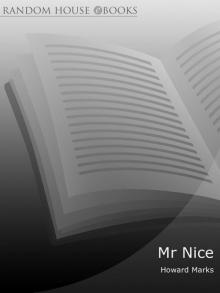 Mr Nice
Mr Nice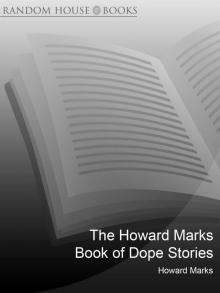 The Howard Marks Book of Dope Stories
The Howard Marks Book of Dope Stories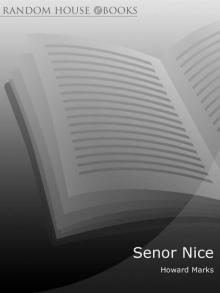 Senor Nice: Straight Life From Wales to South America
Senor Nice: Straight Life From Wales to South America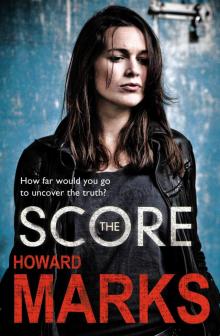 The Score
The Score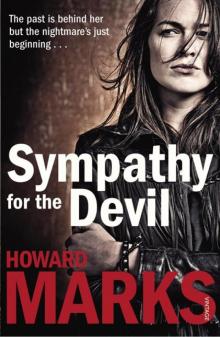 Sympathy for the Devil
Sympathy for the Devil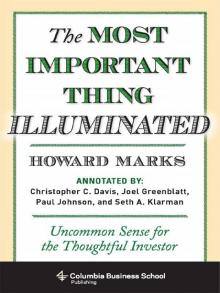 The Most Important Thing Illuminated
The Most Important Thing Illuminated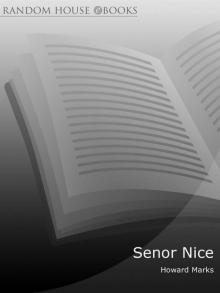 Senor Nice
Senor Nice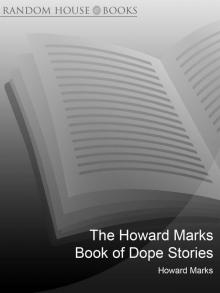 Howard Marks' Book of Dope Stories
Howard Marks' Book of Dope Stories